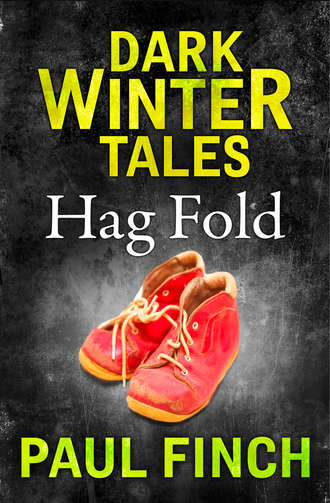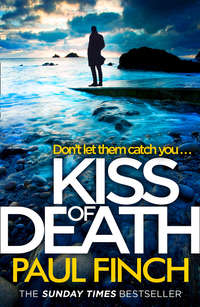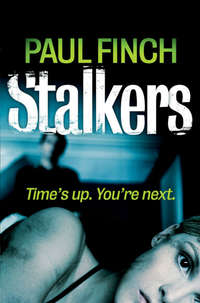
Полная версия
Hag Fold

Hag Fold
Paul Finch

Copyright
Published by Avon
An imprint of HarperCollinsPublishers
1 London Bridge Street
London SE1 9GF
www.harpercollins.co.uk
This ebook edition published by HarperCollins Publishers 2016
First published in paperback and hardback in One Monster Is Not Enough by Gray Friar Press, 2012
Copyright © Paul Finch 2016
Cover design © Debbie Clement 2016
Paul Finch asserts the moral right to be identified as the author of this work.
A catalogue copy of this book is available from the British Library.
This novel is entirely a work of fiction. The names, characters and incidents portrayed in it are the work of the author’s imagination. Any resemblance to actual persons, living or dead, events or localities is entirely coincidental.
All rights reserved under International and Pan-American Copyright Conventions. By payment of the required fees, you have been granted the non-exclusive, non-transferable right to access and read the text of this e-book on screen. No part of this text may be reproduced, transmitted, down-loaded, decompiled, reverse engineered, or stored in or introduced into any information storage and retrieval system, in any form or by any means, whether electronic or mechanical, now known or hereinafter invented, without the express written permission of HarperCollins.
Ebook Edition © January 2016 ISBN: 9780008173760
Version: 2015-12-18
Contents
Cover
Title Page
Copyright
Hag Fold
About the Author
By the Same Author
About the Publisher
On September 12 th 1978, the body of a 19-year-old waitress was found wrapped in a carpet and dumped in a railway underpass near to the council playing fields on Hag Fold Avenue, north Manchester. The girl had been raped and beaten, but death had resulted from a single blow to the throat, delivered with such force that it had completely crushed her windpipe.
Every day he heard the children playing on the other side of the wall. Timmy was only very young, himself; so young that he wasn’t even allowed out of his own backyard, but at least he was able to listen – to their giggles and their squeals, to the pitter-patter of their feet as they charged up and down.
Timmy would sit for hours, picking at the moss between the flagstones, wondering who they were, wondering how many of them were over there. It sounded like a lot. To Timmy, who, apart from his mother, only ever saw the coal-man and the rent-man, this seemed incredible. The children’s house never gave him any clues. It was a mirror image of his own: semi-detached, but tall and narrow and built from sooty brick. The curtains in its windows looked slightly shabbier than the ones in Timmy’s, while its paintwork was cracked and flaking. On one occasion he approached his mother about it, asking who the children were and if he could perhaps go round and play with them.
His mother had simply stared at him, the eyes like marbles in her thin, hard face.
“You will do no such thing,” she said. “Isn’t it bad enough that we have to live in a neighbourhood like this without you getting involved with the likes of them! Christ Almighty, that’s the last thing we want!”
*
Once you’ve crossed that essential Rubicon and taken your first life, it’s easy to do it again. All that matters is the planning and logistics.
The first time I killed, it was three or four at once: Argentine soldiers. Raw recruits, I dare say; muddy, terrified, underfed, but still armed with a GPMG and blazing at us from their dug-out as we assaulted their lines at Goose Green in May 1982. May is late autumn in the South Atlantic, so it was pitch-black and driving with bitter rain. I remember pinpointing them by their tracer, which cut across the battlefront in vivid streaks.
It was pandemonium that dawn. Clouds of orange flame ballooned on the horizon; the ground was churned to quagmires; SAM missiles flocked by overhead, screaming like devils. In such a battery of sound and pyrotechnics, the Argie machine-gunners didn’t notice me ’til it was too late. I launched a grenade into the middle of them. They didn’t even notice that. It flashed and roared and minced at least two of them outright. A third staggered out, a ragged, smouldering, inhuman shape; an overhead flare showed him all blood and tatters, clutching the stump of a severed arm. I levelled my SLR and punched him full of holes. The next one came out screaming hysterically, shooting in all directions. A bad time for my clip to run dry. I dived into the mud as he came towards me. He’d totally lost it, and didn’t spot me as I tripped him and jumped onto him from behind. He was shrieking, frothing at the mouth, struggling wildly. I think he thought I was a comrade, pulling him down to protect him. Ironically, that made him fight all the harder, made him determined not to surrender. Not that I’d have accepted it. You see, combat regiments are all about killing. They pick you to serve in them because they know you will kill. They teach you to kill. They encourage you to kill. You become a fully-trained professional killer. That is your job. And until you actually do it – and enjoy it into the bargain – you aren’t part of the club.
So I killed him. Knifed him. Ten or twelve times before he finally lay still.
*
On November 28 th 1979, the remains of a 26-year-old prostitute and heroin addict were discovered in a burned-out garage on NCB wasteland in the Hag Fold district of Manchester. She had died from asphyxiation, having been garrotted with her own bra, but only after violent rape and prolonged torture with a cigarette lighter.
The first time Timmy saw them was from the top of the coal bunker, but it didn’t give him a great view. Far better was to sneak into the entry between the two houses and peep on the children through the planks in their back gate.
By this time he’d found out who they were, or rather what they were.
Orphans. Or kids who might as well be orphans. The Social Services owned that house, and all the children living there were ‘in care’. They’d either been neglected by their real parents, abused in some way or just kicked out. The first time he heard about this, Timmy felt a unique thrill of horror. His own home life, strictly regimented by the awesome figure of his mother, often left him desperately miserable, but, frequent though the strappings were, not to mention the nights without tea or TV, he could never imagine reaching the situation where his parent grew so irate with him that she’d actually show him the door.
So he watched the children through the cracks in their back gate with a new, morbid wonder. At first he’d expected to see them in rags, the way the paupers had been on that film his mother had taken him to see at the cinema, Oliver! But in this respect he was disappointed. Apparently, they dressed much the way other children did; the girls in sandals, socks and flowered dresses, the lads in short pants and t-shirts. Their very ordinariness was the thing that surprised him most. Their hair was always neatly combed and cut; they didn’t seem especially unhappy – the girls skipped cheerfully with their ropes, the boys played football or with toy soldiers.
However, there was one thing slightly different about them – their age-range.
Timmy was at infant school now, and finally starting to associate with other kids. But these were his classmates, and all were of a similar age to him. The children in the yard next door seemed to be all kinds of different ages. There were six of them in total, three boys and three girls, and they ranged from the youngest boy, who could only have been about three, to the eldest girl, who was ten at least.
That eldest girl was of particular interest to Timmy. He’d only been peeping on them for a couple of weeks when it struck him that she was the real object of his attention. She was tall and slim, with short dark hair, bright eyes and cherry-red lips. She was, Timmy would come to realise in later life, extraordinarily beautiful for one so young, but it wasn’t just this that attracted him. To the other children this girl was clearly the older sister they’d never had. She was the centre of every game, the decider of every issue, the giver of all instructions – though not in the harsh, threatening way that Timmy’s mother was. The rest of the children adored this girl, flocking around her in play, taking their cuts and bumps to her if they fell.
Timmy watched with envy at the love she showed them. But he’d long ago learned not to ask questions in which words like ‘why’ and ‘not’ featured – why did he not have that?, why did he not have this? As far as his mother was concerned, he already had too much – so he mutely accepted that the girl was no part of his life, and felt increasingly hostile to the rest of the children because she was so much a part of theirs. The thought that they were only in the care home because they’d suffered in some way, or had been abandoned, became a source of pleasure to him. He’d gloat to himself as he watched them, wondering excitedly about the things they might have experienced.
The idea that the older girl had also gone through something bad occurred to him as well. He didn’t gloat in her case, but it gave him a funny feeling all the same. A feeling that wasn’t totally displeasing.
*
The first person I came close to killing after the Falklands War was the sort of arrogant bastard who thinks it’s never going to happen to him but has it coming nonetheless.
Liam John Barlow was the type of bloke who thought that, when he’d had a drink or two, he could do anything he wanted to anyone and then go home, have a good night’s sleep and wake up in the morning without the slightest qualm. I don’t know what his background was. I don’t care. He was a habitual criminal and I was a new copper looking to make a name for myself, and that made him fair game.
It was early on in my service and I wasn’t entirely sure how to go about things, so in the end I went about them in the old army way and that, apparently, in the pre-PACE era, was good enough for my bosses.
I was six months into my probation at the time and working foot-patrol through the drab rows of tenements down Spitalfields. During my first half-year in the job I’d made thirty-six arrests – an impressive figure for a new boy, but most of them had been legless drunks or shoplifters who’d already been nabbed by store-detectives.
Barlow was a different kettle of fish. His record for violence was mainly against property – other people’s property it goes without saying – but, as he was nearly seven feet tall, his colossal rages inspired terror in his victims. At the time when I arrested him, he was persecuting a young woman called Milly Turpin, who lived with her widowed mother in a terraced house near Shoreditch station. Milly was an ex-girlfriend of Barlow’s, but now wanted nothing to do with him. Barlow, never a man to forgive when his ego had been bruised, had only grudgingly accepted this and, whenever he got drunk, which was most Fridays and Saturdays, went round to her house to bang and kick the door and throw the dustbins all over the street.
On the night in question, he met me there.
It was slightly off my usual beat, but my section sergeant had posted me there specifically after repeated complaints from Mrs. Turpin. It was likely to be a dangerous job as Barlow could “go a bit”, but the skip reckoned that if an ex-squaddie couldn’t handle it, no-one could.
The first thing I remember is being impressed by Barlow’s size. It was a cold, wet night, and he came lumbering up like something from a Frankenstein movie. He even had the square head to go with it, the barrel body and the great clodhopping feet. I was watching from an entry across the street, well concealed as I didn’t want to dissuade him from doing whatever it was he was planning to do. Not that I think he’d have seen me anyway; he wore thick, bottle-lensed glasses, suggesting restricted vision (which encouraged me all the more). First of all, he knocked on the door. I checked my watch – it was close on twelve. After that he began to shout. Soon he was pulverising the wood with his ham-like fists. I still hung on. I certainly had grounds for a breach-of-the-peace arrest, but, if possible, I wanted something better – a criminal damage or threatening behaviour.
It came to that two seconds later. Barlow ran to the nearest parked car, twisted off its wing mirror and hurled it up at a bedroom window, which duly spider-webbed with cracks. A light came on and Barlow guffawed.
That was when I tapped him on the shoulder.
He sort of gawped at me, blinking through his rain-spattered specs. When I snatched his wrist and began to caution him, he jerked his arm back and launched a massive right hook, which I ducked with ease.
“If some fucking shithead hits you,” I remember being unofficially told at Hendon, “it doesn’t matter how soppy the blow, you hit him back as hard as you can. You’re fully justified. And even if you’re not, we’ll back you to the hilt. We’re not losing any more bobbies just because the likes of the London fucking Students’ Union says we mustn’t fight back!”
That’s what I did. I hit him as hard as I could. Well, first of all, I kicked him in the gonads. A real up-and-under, it was. He went down to his knees, choking. That brought him within fist-in-the-face range. The first shot smashed his glasses. And his nose. The second connected with his left temple, toppling him into the gutter, where he lay groggily, drooling blood and snot. As he tried to lever himself up, I drew my staff and walloped him across the elbow. He went down again hard, his face cracking on the corner of the kerbstone – I so love kerbstones. Blood welled from the resulting wound like blackcurrant jelly.
By this time, Milly Turpin – peroxide blonde, nice legs, big tits, but a little haggard round the boat-race – and her mum, a twenty years older identikit version, had appeared at the front door in teeny bathrobes, and were egging me on.
“Go on … kick his arse!” the younger woman squawked.
“Ne’er mind his arse,” the older woman added. “Kick his fucking head in!”
Who was I to disappoint?
I dragged Barlow from the gutter by his collar, whacking him repeatedly round the head with my truncheon. Soon he was screaming and blubbering like a baby girl, but I wasn’t finished. I kicked him in the guts and stamped on his ruined face and, taking his blood-slick hair in my hand, beat his skull against the bodywork of the car he’d attacked. And only when I got bored, did I call for prisoner transport. Oh – and an ambulance.
I got carpeted later on by the duty inspector. But only because I’d been careless. I’d leathered a scrote in the full view of two civilian witnesses. All right, it was unlikely Milly Turpin or her mother would testify against me if it got to court, but it was a risk I must never take again. On the whole though, they were pleased with the arrest. Liam Barlow was a known troublemaker and, when he came out of the ICU, they’d have him banged to rights on several strong charges.
That was the day I realised I was in the right job.
*
In the early to mid-1980s, there was a lull in the series. By 1985, investigators were daring to hope it had come to an end, the perpetrator either having died or been imprisoned for some other offence. By 1986, the taskforce created to find the ‘Giro City Strangler’ – as he was dubbed by the Greater Manchester Serious Crime Squad – had been scaled down considerably. Police overtime rosters returned to normal. Local women no longer feared to walk the streets at night.
Timmy continued to peep through the care home’s back gate until long after the age when such an activity was permissible. The older girl, who he’d nicknamed ‘Billie’ after a female character he fancied on Here Come the Double Deckers, wasn’t always out there. In fact, the older she grew the less often she appeared with the rest of the children, but that didn’t stop Timmy peeping through the planks at every opportunity.
One day, he found something else to attract his attention, though it wasn’t entirely divorced from his interests next door. His mother had a collection of books about the lives of the saints, and though he’d initially flipped through them because all the saint stories he’d heard had gory endings and he’d wondered if there were any pictures, he found himself returning again and again to one volume in particular, and one chapter in that volume, the one dealing with Joan of Arc.
At first he didn’t even know who Joan of Arc was, or care, but he was fascinated by a painting of her kneeling at a church altar in a suit of armour. With her short, dark hair, lovely eyes and handsome, noble profile, she looked remarkably like ‘Billie’ – so much that the warm feeling he usually got in his tummy when he saw the real girl could soon be replicated just by looking in this particular book. He became so fascinated that he actually read the chapter on Joan of Arc, even though his reading at that time wasn’t good. He was well-rewarded for his efforts. The passages where Joan wept tears of fright when the English showed her their torture chamber, and where she gave out a piteous cry when the first flames began to lick at her on the stake, sent shivers of excitement through him.
One day, his mother asked him why he was always poring over the book.
“Are you thinking of becoming a priest, or something?” she asked, for once affectionately. She knew that his schoolwork was poor, and was always voicing a worry that he might “end up on the dust-carts”.
Timmy looked down at the page in front of him. According to the text, many of the men who had interrogated Joan, binding her and beating her, and calling her “an apostate whore”, had been bishops and priests.
“Maybe,” he said.
*
It’s an odd characteristic of modern humans that we seem to care more about animals than we do our fellow men. A succession of celluloid celebs have ensured their own immortality in a way their paltry movie efforts never could by appearing on news photos with baby seals or fox cubs. Pop stars have embarrassed audiences at award ceremonies by unexpectedly using them as platforms to speak out against hare coursing, whaling, even the use of animals in circuses. I remember a famous TV writer – a faded hippy, by the looks of her – almost weeping on a television news programme over the fate of calves facing transportation in veal crates. On the same bulletin, we’d seen tiny children, wounded and emaciated, fleeing war-ravaged towns somewhere in the Third World, yet no-one made a special guest appearance to cry over that.
Yet, I feel that way too. I care more about animals than people.
Once, I was sent to a Bethnal Green council house, the OAP occupant of which owed several weeks’ fines on a library book he hadn’t returned. When I got there, the place was in silence, all the curtains drawn on its windows. No-one replied to my repeated knocks, so I spoke to the man in the next house, a painfully thin specimen with long hair and stubble, who answered the front door dressed only in tatty jeans and showed arms pitted with needle-tracks. He shrugged when I asked him if he’d seen the old guy or if there were any relatives I could contact.
Eventually I forced entry, expecting the worst.
What I found was worse than the worst.
I gained access by smashing a ground-floor window, but the stench hit me like a sledgehammer as I climbed over the sill. It wasn’t just putrefaction – it was shit as well, vomit, flyblown offal. I’d been in the job several years by this time and had learned to prepare for all eventualities, so I stuffed pieces of cotton wool into my nostrils from the wad I always carried, and was able to continue.
I’d expected a shrunken, mummified thing slumped in an armchair or curled up in some downstairs bed. That was the way you usually found them. Not this time. The lounge looked like a bomb had hit it. Smashed crockery, torn newspapers and shredded upholstery strewed the dirt-clogged carpet. Every item of furniture was overturned, and in the middle of it all lay the old fella, or what was left of him.
He’d been laid bare to the bones. A few scraps of skin and chunks of gristle remained, but virtually all the soft tissue had gone, apart from a couple of lumpy black objects, which I later found out were diseased organs. Even the skull had been cracked open and the brain dug out. Stiff, brown bloodstains caked everything.
At first I thought I was looking at the scene of some bizarre ritual killing, and for a second I wanted to go and beat fifty colours out of the junkie next door. Then I heard the snarling – and it all became clear.
A dog – the old man’s lab – foaming and slavering at the chops, eyes crimson-rimmed, lay on its belly under the overturned armchair. No amount of coaxing would tempt it out. It slashed and snapped if you went within a yard of it. The wretched thing had gone off its rocker, and eventually had to be shot.
Later on, they discovered some undigested hunks of newspaper in what remained of the old man’s stomach and gullet. Crippled with arthritis and abandoned by society, desperate hunger had finally driven him to eat whatever he could get past the brown stubs of his decayed teeth. The coroner reckoned he’d choked to death about two months before I found him.
Sad tale, eh? Still, at least his dog hadn’t starved.
Конец ознакомительного фрагмента.
Текст предоставлен ООО «ЛитРес».
Прочитайте эту книгу целиком, купив полную легальную версию на ЛитРес.
Безопасно оплатить книгу можно банковской картой Visa, MasterCard, Maestro, со счета мобильного телефона, с платежного терминала, в салоне МТС или Связной, через PayPal, WebMoney, Яндекс.Деньги, QIWI Кошелек, бонусными картами или другим удобным Вам способом.







